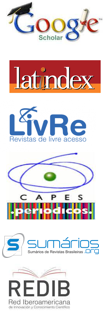Interações e Transformações em Química: Níveis de Conhecimento Necessários Para Alcançar uma Aprendizagem Significativa
DOI:
https://doi.org/10.17921/2447-8733.2018v19n2p209-216Palavras-chave:
Química, Interações e Transformações, Aprendizagem Significativa, Níveis de ConhecimentoResumo
Neste trabalho, por meio de experiência da pesquisadora se constatam as dificuldades dos estudantes na passagem de uma etapa escolar a outra, isto conduziu a propor uma pesquisa cujo objetivo é de identificar e analisar como os conhecimentos prévios esperados dos estudantes podem ser usados para o desenvolvimento de novos conhecimentos, quando se deseja que os mesmos tenham uma aprendizagem significativa e que possa ser útil tanto na escola como na vida em sociedade. Para tal se considera como referencial teórico da pesquisa a teoria da aprendizagem significativa de David Ausubel e a noção de níveis de conhecimento esperados dos estudantes, segundo a definição de Aline Robert. Trata-se de uma pesquisa qualitativa cujo método é o da pesquisa documental para a qual se construiu uma grade de análise com o propósito de compreender como são tratados os três níveis de conhecimento no ensino e aprendizagem de interações e transformações químicas. Após mostrar o funcionamento da grade, consideram-se exemplos da análise do “caderno do professor” e os resultados mostram que é preciso uma atenção especial do professor, com um discurso adequado que leve em conta os conhecimentos prévios de seus estudantes de forma a atingir o nível disponível e, assim, permitir que os estudantes alcancem uma aprendizagem significativa. Como conclusão se considera que é preciso criar momentos de discussões com os professores do Ensino Médio para que estes possam identificar os conhecimentos prévios de seus estudantes e introduzir novos conhecimentos a partir dos que eles já possuem.
Palavras-chave: Química. Aprendizagem Significativa. Níveis de Conhecimento.
Abstract
In this study, through the researcher’s experience the students’ difficulties are observed in the passage from one school stage to another, this led to propose a research whose goal is to identify and analyze how the prior knowledge expected from students can be used for the new knowledge development, when it is expected that they have a meaningful learning and that can be useful both in school and in life in society. Thus, as a theoretical study is considered of the theory of significant learning from David Ausubel and the notion of knowledge levels expected from students, according to the Aline Robert’s definition. This is a qualitative research whose method is the documentary research for which they built a grid of analysis with the purpose to understand how all three levels of knowledge are treated in teaching and learning of chemical interactions and transformations. After showing the grid operation, examples of analysis are considered of the "Teacher's book" and the results show that a special attention from the teacher is necessary, with a suitable discourse that takes into account the previous knowledge of their students in order to achieve the level available and, thus, allow students to achieve a meaningful learning. As a conclusion if it considered that it is necessary to create moments of discussions with High School’s teachers so that they can identify the students’ prior knowledge and introduce new knowledge from what they already have.
Keywords: Chemistry. Significant Learning. Knowledge Levels
Referências
BRASIL. Parâmetros Curriculares Nacionais Ensino Médio. Parte I – Bases Legais. 2000. Disponível em: http://portal.mec.gov.br/seb/arquivos/pdf/blegais.pdf. Acesso em: 10 jan. 2018.
BRASIL. Parâmetros Curriculares Nacionais Ensino Médio. Parte III – Ciências da Natureza, Matemática e suas Tecnologias. 2000. Disponível em: file:///C:/Users/STRICTO/Desktop/marlene/PCN%20EM-%20Q.%20p.%2030-39.pdf. Acesso em: 10 jan. 2018.
DIAS, M.A. Les problèmes d'articulation entre points de vue cartésien et paramétrique dans l'enseignement de l'algèbre linéaire. Tese de doutorado da Universidade Dennis Diderot – Paris 7. França, 1998.
LDB. Lei nº 9.394, de 20 de dezembro de 1996. Diretrizes e bases da educação nacional. http://portal.mec.gov.br/seed/arquivos/pdf/tvescola/leis/lein9394.pdf. Acesso em: 30 jan. 2018.
LÜDKE, M.; ANDRÉ, M.E.D.A. Pesquisa em educação: abordagens qualitativas. São Paulo: EPU, 2013.
MOREIRA, M.A.; MASINI, E. Aprendizagem significativa: a teoria de David Ausubel. São Paulo: Moraes, 1982.
MOREIRA, M.A. Al final, qué es aprendizaje significativo. Rev. Qurriculum, v.25, p.29-56, 2012.
ROBERT, A. Outils d’analyse des contenus mathématiques à enseigner au lycée et à l’université. Recherches en Didactique des Mathématiques, v.18, p.192-212, 1998.
ROBERT, A. Niveaux de conceptualisation et enseignement secondaire. In: DORIER, J.L. et al. L’enseignement de l’algèbre lineaire en question. Grenoble: La Pensée Sauvage, 1997. p.149-157.
SÃO PAULO. Química: ciências da natureza. Caderno do Professor, v.1, 2014.
UNESP. Provas e gabaritos. 2004. Disponível em: http://www.curso-objetivo.br/vestibular/resolucao_comentada/Unesp/Unesp2004.asp?img=01. Acesso em: 30 jan. 2018.


